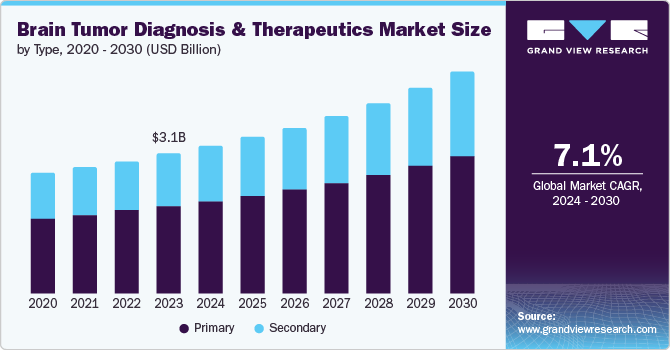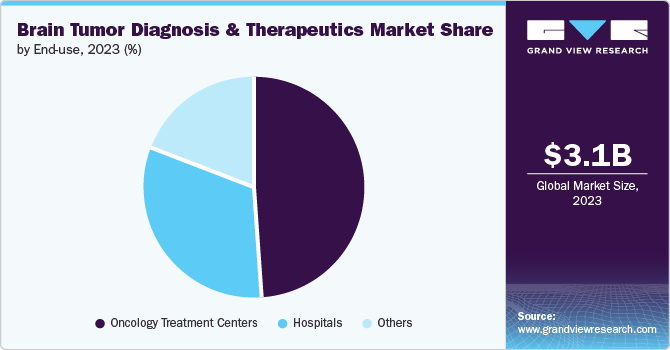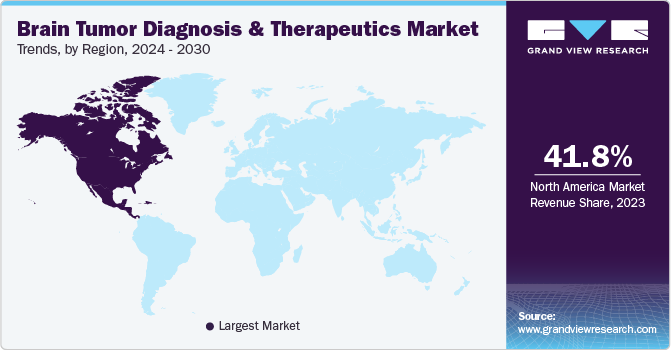
Brain Tumor Diagnosis And Therapeutics Market Size, Share & Trends Analysis Report By Type (Primary, Secondary), By Product, By Diagnosis (MRI, CT, PET-CT), By Therapeutics, By End Use, By Region, And Segment Forecasts, 2025 - 2030
- Report ID: GVR-1-68038-349-2
- Number of Report Pages: 100
- Format: PDF
- Historical Range: 2018 - 2023
- Forecast Period: 2025 - 2030
- Industry: Healthcare
Market Size & Trends
The global brain tumor diagnosis and therapeutics market size was estimated at USD 3.28 billion in 2024 and is projected to grow at a CAGR of 7.3% from 2025 to 2030. Notably, the aging global population and lifestyle changes have intensified the demand for effective diagnostic and therapeutic solutions, particularly as the incidence of brain tumors has surged. According to the World Health Organization, there were approximately 308,102 new cases of brain and central nervous system tumors diagnosed in 2020, with over 251,000 deaths registered annually. This alarming trend underscores the necessity for early diagnosis and intervention, thus fueling market expansion.

The prevalence of Glioblastoma (GBM), the most common brain cancer, particularly among older adults, has significantly influenced market growth. The National Library of Medicine reported an incidence rate of approximately 3.19-3.2 cases per 100,000 people in the U.S., with over 14,490 Americans expected to receive a GBM diagnosis in 2023, as reported by the National Brain Tumor Society. Unfortunately, the prognosis remains bleak, especially for patients aged 65 and older, emphasizing the urgent need for innovative treatment options and durable therapies in the ongoing fight against this aggressive cancer.
Advancements in diagnostic imaging technologies have significantly enhanced the capabilities within the market. The introduction of modern modalities such as MRI, CT scans, and PET imaging has revolutionized brain tumor diagnosis, allowing for earlier and more accurate detection. The application of 7T MRI scanners has particularly improved tumor imaging, resulting in better patient outcomes. Moreover, innovations in molecular diagnostics and biomarker-based testing have paved the way for precise tumor identification, enabling personalized treatment approaches that optimize efficacy.
Moreover, the growing healthcare infrastructure, along with increased spending in both developed and emerging markets such as India and China, has expanded access to these advanced diagnostic tools and therapeutic options. The investment in sophisticated diagnostic technology in this region is anticipated to further bolster the diagnosis and management of brain tumors.
Type Insights
The primary segment dominated the market and accounted for a share of 62.7% in 2024. Primary brain tumors encompass a wide range, including meningioma, gliomas, astrocytes, and pituitary tumors. Each requires specific diagnostic treatment, leading to diverse diagnoses and therapies. Technological advancements and treatments improve the patient’s experience with primary brain tumors. The increasing emphasis on personalized medicine and patient-centric approaches drives market growth.
Secondary tumors are expected to grow at the fastest CAGR of 7.5% over the forecast period. This type of tumor is more common than the primary brain tumor, as it grows in other parts of the body. Advancements in imaging technologies have improved the detection of secondary brain tumors, such as MRI and CT scans. As the population ages, there is a corresponding increase in secondary brain tumors, which fuels the need for brain tumor diagnosis and therapeutics. In addition, increased awareness about the symptoms and early detection allows early access to the therapy and diagnosis.
Product Insights
Stains & varnishes led the market and accounted for a share of 25.7% in 2024. Stains and varnishes are essential tools that assist pathologists in visualizing cell structures under a microscope, facilitating the identification of tumor cells. Specific stains enable the differentiation of various cellular types within a tumor, which is critical for understanding its nature and aggressiveness. Furthermore, staining techniques also play a significant role in assessing tumor grade, directly influencing the selection of the most appropriate treatment strategies for patients diagnosed with brain tumors. This comprehensive analysis enhances diagnostic accuracy and treatment efficacy.
Lacquers are expected to grow significantly over the forecast period. Lacquers have been utilized as topical treatments for fungal infections, particularly onychomycosis, as well as skin and scalp infections. These lacquers, which contain antifungal medications such as amorolfine and ciclopirox, deliver treatment directly to the nail through transungual drug delivery systems. They are effective in improving nail appearance with consistent use while minimizing systemic side effects. Most users experience only mild, temporary side effects, making them a safer option for long-term antifungal therapy.
Diagnosis Insights
CT scan dominated the market with a revenue share of 25.8% in 2024. It offers high accuracy in detecting brain tumors. Imaging technologies provide precise brain images, allowing healthcare specialists to accurately perceive the location, size, and tumor characteristics. CT scan is preferred over traditional approaches such as biopsies because CT scan is easy to perform without any life threats. In addition, CT scan diagnosis allows early detection of tumors, enabling healthcare professionals to initiate interventions during surgery, radiation therapy, and chemotherapy, among others.
Cerebral arteriogram is expected to grow at the fastest CAGR of 8.9% over the forecast period. Cerebral arteriograms assist in correctly localizing brain tumors with the help of mapping out the blood vessels that supply the tumor. This is crucial for surgical planning and determining the feasibility of tumor removal. In addition, accurately locating the arteries that feed into a brain tumor is important for formulating targeted treatment strategies with embolization or selective chemotherapy delivery. Cerebral arteriograms offer special insights into these feeding arteries.
Therapeutics Insights
Surgery held the largest market share of 35.6% in 2024. Surgery is often the preferred initial treatment while removing tumors with this method surgeon can remove several tumors as possible. For instance, if the tumor is in deep places or crucial areas, a surgical procedure addresses the affected areas. The growth of the surgery segment can be attributed to its precision in tumor elimination, capacity to provide tissue samples for accurate analysis, role in debulking and symptom relief, and capacity for personalized treatment techniques.
Targeted therapy is expected to grow at the fastest CAGR of 8.3% over the forecast period. Targeted therapy gives a precise medical drug method, identifying unique molecular targets specific to cancer cells. This customized treatment approach has resulted in powerful and centered treatment of brain tumors while minimizing harm to healthy cells. In addition, targeted therapy drives market growth through its improved efficiency, reduced side effects, resistance mitigation capabilities, and advances in molecular profiling techniques.
End Use Insights
Oncology treatment centers held the largest market share of 48.5% in 2024. Oncology treatment centers are committed facilities that specialize in the diagnosis and treatment of cancer, along with brain tumors. These facilities commonly have a healthcare professional with a specialized understanding of oncology, neurology, neurosurgery, radiation oncology, and related fields. The specialization enables them to offer complete and personalized care to patients with brain tumors. The segment’s growth is attributed to access to advanced technology, patient care approaches, and continuous research and development.

Hospitals are projected to grow lucratively over the forecast period. Hospitals play a pivotal role in the treatment and offer comprehensive services with high-tech devices such as MRIs & CT scans. In addition, hospital settings allow the population to access healthcare facilities with a wide range of treatment options for ailments and disorders. Moreover, collaboration with academic institutes and research facilities with technological innovation and devices has enhanced the hospital facilities.
Regional Insights
North America brain tumor diagnosis and therapeutics market dominated the global market with a revenue share of 41.9% in 2024. Key drivers in the healthcare sector have included developed healthcare infrastructure, high healthcare expenditure, and early adoption of innovative medical technologies. A growing geriatric population, collaboration between government and private companies investing in clinical technologies, significant per capita spending, and increased awareness regarding early diagnosis have all contributed to advancements in healthcare access and quality.

U.S. Brain Tumor Diagnosis And Therapeutics Market Trends
The brain tumor diagnosis and therapeutics market in the U.S. dominated the North America market with a revenue share of 90.9% in 2024, driven by improved infrastructure, heightened awareness of advanced technologies, and a significant number of brain tumor diagnoses. In 2023, approximately 24,810 adults in the U.S. were diagnosed with primary cancerous brain and spinal cord tumors, as reported by the American Cancer Society. Moreover, extensive research and development activities and increasing healthcare awareness regarding treatment and management contributed to this dominance.
Europe Brain Tumor Diagnosis And Therapeutics Market Trends
Europe brain tumor diagnosis and therapeutics market held substantial market share in 2024. Technological improvements, along with a growing prevalence of brain tumors, significantly boosted the demand for effective therapies. Rising awareness about the importance of early diagnosis and favorable reimbursement policies further propelled the need for innovative treatment options. Collectively, these factors have contributed to an enhanced focus on developing therapies for brain tumor management.
The brain tumor diagnosis and therapeutics market in Germany is expected to grow in the forecast period. Germany has established a robust healthcare infrastructure that supports the adoption of advanced medical technologies and treatments. The rising prevalence of brain tumors, particularly glioblastoma multiforme, combined with increasing awareness of early diagnosis and treatment options, has fueled market growth. A preference for minimally invasive surgical techniques, favorable reimbursement policies, and an escalating geriatric population further contribute to the demand for innovative therapeutics in the country.
Asia Pacific Brain Tumor Diagnosis And Therapeutics Market Trends
Asia Pacific brain tumor diagnosis and therapeutics market is expected to register the fastest CAGR of 8.7% in the forecast period. In recent years, rapid advancements in healthcare infrastructure and increasing investments in medical research significantly elevated the prevalence of brain tumors. Countries such as China, India, and Japan expanded access to advanced diagnostic technologies, including MRI and CT scans, alongside novel treatment options such as targeted therapies and immunotherapies. Growing awareness, an aging population, and improved healthcare policies further fueled the adoption of these solutions in the region.
The brain tumor diagnosis and therapeutics market in China dominated the Asia Pacific brain tumor diagnosis and therapeutics market in 2024. In recent years, China has focused on expanding access to advanced diagnostic technologies and novel treatment options. Recent advancements in diagnostic techniques and modern therapies have fueled market growth in China. Increased healthcare expenditure, growing awareness campaigns, and the aging population’s rising incidence of glioblastomas contributed to this trend. Government support and the recent approval of precision oncology drugs, such as Vitrakvi, further enhanced the adoption of innovative treatment solutions.
Key Brain Tumor Diagnosis And Therapeutics Company Insights
Some key companies in the brain tumor diagnosis and therapeutics market include Amgen Inc.; AstraZeneca; Bayer AG; GE HealthCare.; F. Hoffmann-La Roche Ltd; Eisai Co., Ltd.; and others. Organizations focus on increasing their customer base to gain a competitive edge in the industry. Therefore, key players are undertaking several strategic initiatives, such as mergers and acquisitions, and partnerships with other major companies.
-
AstraZeneca is a leading international biopharmaceutical company. The organization emphasizes the power of technology and innovation in driving improvements in the medical sector. AstraZeneca explores various therapeutic regions to discover new treatments and improve existing ones, with a huge product pipeline.
-
Bayer AG is a German multinational pharmaceutical and biotechnology company in healthcare and agriculture. Bayer AG continues to focus on research and developments to convey innovation and technologies to the market for healthcare and agriculture. The company markets its products globally through diverse channels with wholesalers, pharmacies, hospitals, and retailers.
Key Brain Tumor Diagnosis And Therapeutics Companies:
The following are the leading companies in the brain tumor diagnosis and therapeutics market. These companies collectively hold the largest market share and dictate industry trends.
- Amgen Inc.
- AstraZeneca
- Bayer Corporation
- GE HealthCare
- F. Hoffmann-La Roche Ltd
- Eisai Co., Ltd.
- Bristol-Myers Squibb Company
- Pfizer Inc.
- Shimadzu Corporation
- Siemens Healthineers AG
Recent Developments
-
In September 2024, Enhertu demonstrated significant clinical activity in patients with HER2-positive metastatic breast cancer and brain metastases in the largest prospective trial conducted in Europe, achieving a 61.6% progression-free survival rate.
-
In May 2024, GE HealthCare launched AI-enhanced oncology solutions at the ESTRO 2024 Congress in Glasgow, aiming to streamline radiation therapy workflows and personalize cancer care for improved patient outcomes.
-
In March 2024, AstraZeneca acquired Fusion to accelerate developments in cancer treatments. The acquisition focuses on replacing traditional treatments such as chemotherapy and radiotherapy with a modernized approach.
-
In January 2024, GE HealthCare acquired MIM Software. This agreement facilitates MIM software with AI-enabled imaging and workflow tools across various sectors such as oncology, and neurology healthcare sectors.
Brain Tumor Diagnosis and Therapeutics Market Report Scope
|
Report Attribute |
Details |
|
Market size value in 2025 |
USD 3.48 billion |
|
Revenue forecast in 2030 |
USD 4.94 billion |
|
Growth rate |
CAGR of 7.3% from 2025 to 2030 |
|
Base year for estimation |
2024 |
|
Historical data |
2018 - 2023 |
|
Forecast period |
2025 - 2030 |
|
Quantitative units |
Revenue in USD million/billion, and CAGR from 2025 to 2030 |
|
Report coverage |
Revenue forecast, company ranking, competitive landscape, growth factors, trends |
|
Segments covered |
Type, product, diagnosis, therapeutics, end use, region |
|
Regional scope |
North America; Europe; Asia Pacific; Latin America; Middle East & Africa |
|
Country scope |
U.S., Canada, Mexico, UK, Germany, France, Italy, Spain, Denmark, Sweden, Norway, China, Japan, India, Australia, South Korea, Thailand, Brazil, Argentina, South Africa, Saudi Arabia, UAE, Kuwait |
|
Key companies profiled |
Amgen Inc.; AstraZeneca; Bayer Corporation; GE HealthCare; F. Hoffmann-La Roche Ltd; Eisai Co., Ltd.; Bristol-Myers Squibb Company; Pfizer Inc.; Shimadzu Corporation; Siemens Healthineers AG |
|
Customization scope |
Free report customization (equivalent up to 8 analysts working days) with purchase. Addition or alteration to country, regional & segment scope. |
|
Pricing and purchase options |
Avail customized purchase options to meet your exact research needs. Explore purchase options |
Global Brain Tumor Diagnosis And Therapeutics Market Report Segmentation
This report forecasts revenue growth at global, regional, and country levels and provides an analysis of the latest industry trends in each of the sub-segments from 2018 to 2030. For this study, Grand View Research has segmented the global brain tumor diagnosis and therapeutics market report based on type, product, diagnosis, therapeutics, end use, and region:
-
Type Outlook (Revenue, USD Million, 2018 - 2030)
-
Primary
-
Meningioma
-
Gliomas
-
Astrocytomas
-
Pituitary Tumors
-
Others
-
-
Secondary
-
-
Product Outlook (Revenue, USD Million, 2018 - 2030)
-
Stains & Varnishes
-
Shellacs
-
Lacquers
-
Others
-
-
Diagnosis Outlook (Revenue, USD Million, 2018 - 2030)
-
MRI
-
CT Scan
-
Tissue Sampling
-
PET-CT scan
-
Cerebral Arteriogram
-
Lumbar Puncture
-
Molecular Testing
-
EEG
-
Others
-
-
Therapeutics Outlook (Revenue, USD Million, 2018 - 2030)
-
Surgery
-
Radiation Therapy
-
Chemotherapy
-
Immunotherapy
-
Targeted Therapy
-
Others
-
-
End Use Outlook (Revenue, USD Million, 2018 - 2030)
-
Hospitals
-
Oncology Treatment Centers
-
Others
-
-
Regional Outlook (Revenue, USD Million, 2018 - 2030)
-
North America
-
U.S.
-
Canada
-
Mexico
-
-
Europe
-
UK
-
Germany
-
France
-
Italy
-
Spain
-
Denmark
-
Sweden
-
Norway
-
-
Asia Pacific
-
Japan
-
China
-
India
-
Australia
-
South Korea
-
Thailand
-
-
Latin America
-
Brazil
-
Argentina
-
-
Middle East & Africa
-
South Africa
-
Saudi Arabia
-
UAE
-
Kuwait
-
-
We are committed towards customer satisfaction, and quality service.
"The quality of research they have done for us has been excellent."




